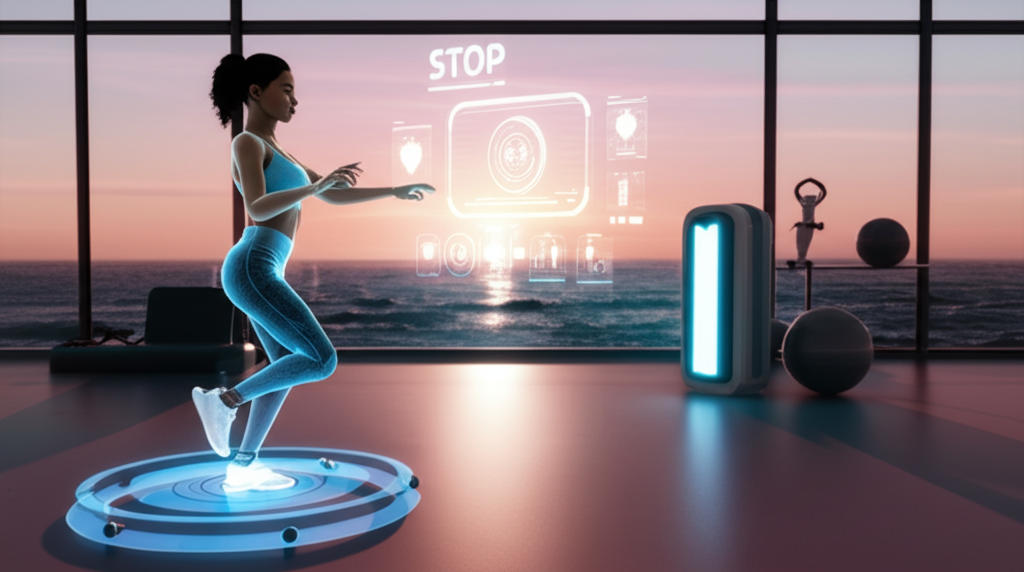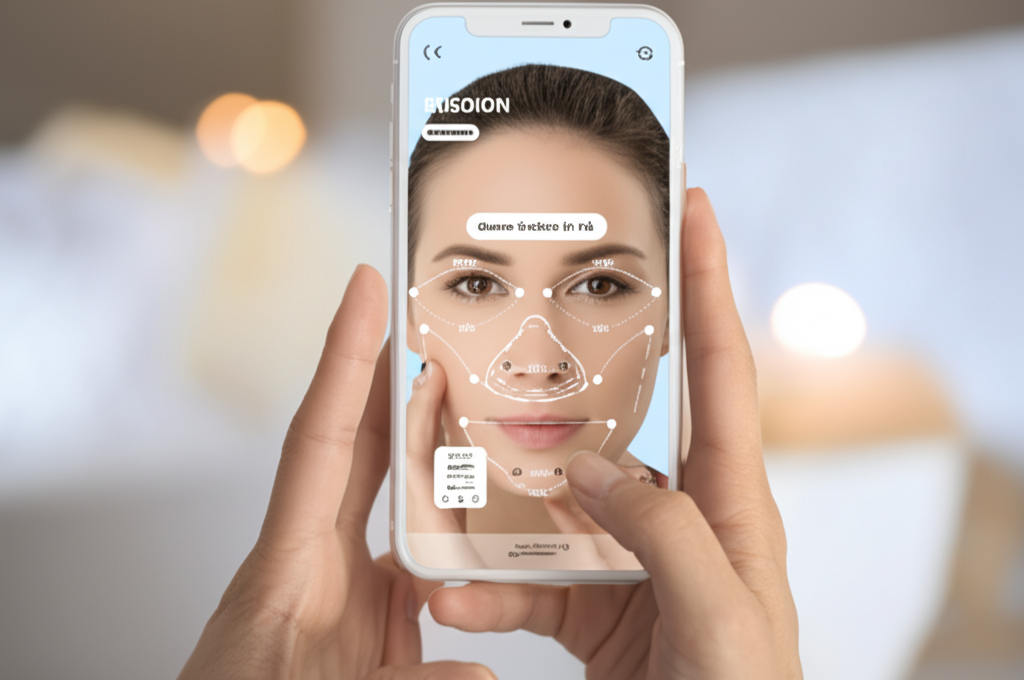AI Revolution in Fitness: How Technology is Transforming Personal Training
Discover how artificial intelligence is reshaping the fitness industry, making personalized training more accessible, effective, and engaging than ever before.

The fitness industry has undergone numerous transformations over the decades, from the aerobics boom of the 1980s to the rise of boutique fitness studios in the 2010s. But perhaps no change has been as profound or far-reaching as the current AI revolution in personal training and fitness technology.
Artificial intelligence is fundamentally changing how we approach fitness, making personalized training more accessible, effective, and engaging than ever before. What was once available only to elite athletes or those who could afford expensive personal trainers is now accessible to anyone with a smartphone.
In this comprehensive guide, we'll explore how AI is revolutionizing six key areas of fitness: workout planning, form correction, nutrition optimization, recovery monitoring, motivation and adherence, and the future of fitness technology. We'll also look at the science behind AI-powered fitness and how you can leverage these technologies to transform your own fitness journey.
The Limitations of Traditional Fitness Approaches
Before diving into how AI is transforming fitness, it's worth understanding the limitations of traditional approaches to exercise and training:
- One-size-fits-all programs that don't account for individual differences in biomechanics, fitness levels, or goals
- Limited feedback on form and technique, leading to suboptimal results and potential injury
- Generic nutrition advice that doesn't consider individual metabolic differences or dietary preferences
- Inadequate recovery monitoring, often resulting in overtraining or undertraining
- Motivation and adherence challenges without consistent accountability
According to a study published in the Journal of Medical Internet Research, approximately 50% of people who start a new exercise program drop out within the first six months. This high attrition rate is often attributed to the limitations mentioned above.
AI technology addresses these limitations by providing personalized, adaptive, and data-driven approaches to fitness that evolve with you as you progress.
AI-Powered Workout Planning and Progression

Perhaps the most significant impact of AI on fitness is in the realm of workout planning and progression. Traditional workout programs typically fall into one of two categories: generic plans designed for the masses or expensive custom plans created by personal trainers.
AI-powered fitness platforms offer a third option: truly personalized workout plans that adapt in real-time based on your performance, preferences, and progress.
Personalization Beyond Templates
AI workout planning goes far beyond simple templated programs by considering numerous factors specific to you:
- Your current fitness level and exercise history
- Specific goals (strength, hypertrophy, endurance, weight loss, etc.)
- Available equipment and preferred exercise modalities
- Time constraints and workout frequency preferences
- Injury history and movement limitations
- Exercise preferences and enjoyment factors
BetterU AI's fitness platform uses machine learning algorithms to analyze over 50 different variables when creating your workout plan, resulting in a program that's as unique as your fingerprint.
Dynamic Adaptation
Unlike static workout programs, AI-powered plans evolve based on your performance and progress:
- Auto-regulation of intensity - If you're crushing your workouts, the AI will increase the challenge; if you're struggling, it will adjust accordingly
- Exercise substitution - The AI can swap exercises based on equipment availability, joint comfort, and movement preferences
- Volume and frequency adjustments - Based on your recovery capacity and schedule changes
- Progressive overload optimization - Precisely calibrated increases in weight, reps, or sets based on your adaptation rate
A 2019 study published in Frontiers in Physiology found that adaptive training programs that adjust based on individual performance led to 23% greater strength gains compared to non-adaptive programs.
Predictive Analytics for Optimal Results
Advanced AI systems don't just react to your past performance—they predict future outcomes to optimize your training:
- Plateau prediction - Identifying when you're likely to hit a plateau and proactively adjusting your program
- Optimal volume finding - Determining your personal minimum effective dose of training for results
- Exercise selection optimization - Identifying which exercises produce the best results for your specific body type and goals
This predictive capability means you're not just following a program—you're following the optimal program for your body at every stage of your fitness journey.
Real-Time Form Correction and Technique Analysis

Proper exercise technique is crucial for both safety and effectiveness. Traditionally, getting feedback on your form required working with a personal trainer or coach—an expensive proposition that's not accessible to everyone.
AI-powered computer vision technology has changed this equation entirely, making real-time form correction available to anyone with a smartphone camera.
Computer Vision for Movement Analysis
Modern AI fitness applications use sophisticated computer vision algorithms to analyze your movement patterns:
- Joint angle tracking - Measuring precise angles at the knees, hips, shoulders, and other joints during exercises
- Movement path analysis - Ensuring that weights or body parts move along optimal trajectories
- Tempo and timing assessment - Analyzing the speed of different phases of each exercise
- Range of motion evaluation - Ensuring you're achieving full range of motion for maximum benefit
These systems can detect subtle form issues that even experienced trainers might miss, providing a level of precision previously available only in biomechanics laboratories.
Immediate Feedback and Correction
The real power of AI form correction lies in its immediacy and specificity:
- Real-time audio cues - Verbal instructions during the exercise to correct form issues as they occur
- Visual overlays - Graphical indicators showing proper joint positions and movement paths
- Post-set analysis - Detailed breakdown of form after each set with specific improvement suggestions
- Progression tracking - Monitoring improvements in technique over time
A study published in the journal Sports found that participants who received real-time form feedback showed 43% greater improvement in exercise technique compared to those who received only traditional instruction.
Injury Prevention and Performance Optimization
Beyond just correcting obvious form errors, advanced AI systems can identify subtle patterns that might lead to injury or suboptimal results:
- Movement asymmetries - Detecting when one side of the body is working differently than the other
- Compensation patterns - Identifying when certain muscles are taking over for weaker ones
- Fatigue-based form breakdown - Alerting you when technique deteriorates due to fatigue
BetterU AI's form analysis technology can detect over 30 different common form errors across major exercises, providing specific corrections tailored to your body type and movement patterns.
AI-Powered Nutrition Optimization

Nutrition is a critical component of any fitness journey, yet it's often the most confusing and challenging aspect for many people. Generic meal plans and one-size-fits-all nutrition advice rarely account for individual differences in metabolism, preferences, and lifestyle.
AI is transforming nutrition planning by creating truly personalized approaches based on your unique needs and preferences.
Personalized Macro and Calorie Targets
AI nutrition systems go beyond basic calculators by considering multiple factors to determine your optimal intake:
- Metabolic rate estimation - Using machine learning to predict your actual metabolic rate based on multiple data points
- Activity-specific adjustments - Accounting for the exact exercises you're doing, not just generic activity levels
- Adaptive targets - Adjusting calorie and macro recommendations based on your actual results and progress
- Goal-specific optimization - Tailoring nutrition to support specific goals like muscle building, fat loss, or performance
Research published in the American Journal of Clinical Nutrition found that personalized nutrition advice led to significantly greater adherence and results compared to generic guidelines.
Meal Planning and Recipe Recommendations
AI takes the guesswork out of "what to eat" by generating meal plans and recipes that align with your goals and preferences:
- Preference-based recommendations - Suggesting meals based on your taste preferences and dietary restrictions
- Ingredient substitution - Automatically adapting recipes to accommodate allergies or food aversions
- Grocery list generation - Creating shopping lists based on your meal plan
- Restaurant order suggestions - Recommending menu items when dining out that align with your nutrition goals
BetterU AI's nutrition platform can generate thousands of meal combinations that precisely match your macronutrient targets while respecting your food preferences and restrictions.
Real-Time Tracking and Feedback
Modern AI nutrition systems make tracking your intake easier and more accurate than ever:
- Photo-based food recognition - Simply take a picture of your meal for automatic logging
- Portion size estimation - AI algorithms that can estimate portion sizes from images
- Pattern recognition - Identifying eating patterns and suggesting improvements
- Predictive analysis - Forecasting how current nutrition choices will impact future results
This real-time feedback creates a continuous learning loop that helps you develop better nutrition habits while still enjoying foods you love.
Recovery Optimization and Injury Prevention

Recovery is perhaps the most overlooked aspect of fitness, yet it's during recovery—not during exercise—that your body actually adapts and improves. Traditional approaches to recovery are often based on generic recommendations or subjective feelings.
AI is transforming recovery monitoring by providing objective, data-driven insights that help optimize the balance between training and recovery.
Holistic Recovery Assessment
Advanced AI systems analyze multiple data points to assess your recovery status:
- Heart rate variability (HRV) - Measuring the variation in time between heartbeats as an indicator of nervous system recovery
- Sleep quality metrics - Analyzing duration, stages, and disturbances in your sleep
- Subjective readiness - Processing your responses to questions about fatigue, soreness, and mood
- Performance metrics - Tracking changes in strength, power, or endurance as indicators of recovery status
By combining these data points, AI can create a comprehensive picture of your recovery status that's far more accurate than any single metric alone.
Adaptive Training Modifications
Based on your recovery assessment, AI can make intelligent adjustments to your training plan:
- Volume and intensity adjustments - Reducing training load when recovery is compromised
- Exercise selection modifications - Switching to less demanding movements when needed
- Recovery session recommendations - Suggesting active recovery or complete rest based on your status
- Split routine adjustments - Reorganizing your training split to allow for better recovery
A study published in the Journal of Strength and Conditioning Research found that athletes who adjusted their training based on HRV measurements showed 14% greater performance improvements compared to those following fixed programs.
Personalized Recovery Protocols
Beyond just modifying training, AI can recommend specific recovery strategies based on your individual needs:
- Targeted mobility work - Suggesting specific mobility exercises for areas showing movement restrictions
- Nutrition interventions - Recommending specific nutrients or timing strategies to enhance recovery
- Sleep optimization - Providing personalized recommendations to improve sleep quality
- Stress management techniques - Suggesting mental recovery strategies based on stress indicators
BetterU AI's recovery system integrates with wearable devices to continuously monitor your recovery status and provide real-time recommendations to optimize your training response.
Motivation, Adherence, and Behavioral Psychology

Even the most perfectly designed workout and nutrition plans are worthless if you don't follow them consistently. Adherence is the single most important factor in fitness success, yet it's where most people struggle the most.
AI is revolutionizing the psychological aspects of fitness by applying principles of behavioral psychology in personalized, adaptive ways.
Personalized Motivation Strategies
Different people are motivated by different factors, and AI can identify and leverage your unique motivational drivers:
- Motivational type identification - Determining whether you're motivated by achievement, social recognition, health benefits, or other factors
- Tailored messaging - Providing encouragement and reminders that align with your specific motivational type
- Goal framing - Presenting goals and progress in ways that resonate with your psychological preferences
- Reward system customization - Creating reward structures that align with what actually motivates you
Research in the Journal of Health Psychology has shown that matching motivational strategies to individual personality types can increase exercise adherence by up to 27%.
Habit Formation and Behavior Change
AI systems apply proven behavior change principles to help you develop lasting fitness habits:
- Habit stacking - Suggesting ways to connect new fitness behaviors to existing habits
- Implementation intentions - Helping you create specific plans for when, where, and how you'll exercise
- Micro-commitment strategies - Breaking down intimidating fitness goals into tiny, manageable actions
- Habit tracking and streaks - Leveraging consistency tracking to build momentum
BetterU AI's behavioral psychology system analyzes your patterns to identify optimal times for exercise, potential obstacles, and the most effective strategies for your specific psychological profile.
Adaptive Accountability
AI provides a level of accountability that adapts to your changing needs:
- Intelligent reminders - Notifications that adapt based on your response patterns and current context
- Progressive autonomy - Gradually reducing external accountability as internal motivation develops
- Social accountability integration - Optional connections with friends or community for additional motivation
- Celebration of milestones - Recognizing achievements in ways that reinforce your intrinsic motivation
This adaptive approach to accountability avoids the common pitfalls of both too much external pressure (which can lead to rebellion) and too little support (which can lead to abandonment).
The Future of AI in Fitness
While the current applications of AI in fitness are already impressive, we're still in the early stages of this technological revolution. Here's a glimpse of what's coming in the near future:
Integrated Biometric Feedback
Future AI fitness systems will incorporate even more sophisticated biometric data:
- Real-time blood biomarker analysis - Continuous monitoring of hormones, nutrients, and other biomarkers
- Muscle activation patterns - Non-invasive EMG monitoring to ensure optimal muscle recruitment
- Genetic response prediction - Personalization based on your genetic predispositions to different types of training
- Brain activity monitoring - Neurofeedback to optimize mental aspects of performance
Immersive Training Experiences
The combination of AI with virtual and augmented reality will create entirely new fitness experiences:
- AI-powered virtual coaches - Photorealistic virtual trainers that provide real-time guidance and motivation
- Gamified fitness environments - Immersive worlds where exercise progress translates to game advancement
- Digital twins - Virtual representations of your body that accurately model how different training approaches will affect you
- Social training networks - Connected virtual environments where you can train with others regardless of physical location
Predictive Health Integration
AI fitness systems will increasingly connect with broader health monitoring:
- Disease risk reduction - Training programs specifically designed to address your personal health risk factors
- Longevity optimization - Exercise and nutrition protocols tailored to maximize healthspan and lifespan
- Mental health integration - Fitness programs that adapt based on mental health indicators and needs
- Healthcare system integration - Seamless sharing of fitness data with healthcare providers for truly holistic health management
These advancements will further blur the line between fitness and healthcare, creating truly personalized approaches to physical wellbeing that consider all aspects of health.
Getting Started with AI-Powered Fitness
If you're ready to experience the benefits of AI-powered fitness, here are some steps to get started:
- Identify your primary fitness goals - Be clear about what you want to achieve, whether it's strength, weight loss, performance, or general health
- Choose integrated platforms over single-purpose tools - Look for AI systems that connect workout planning, form correction, nutrition, and recovery for a more holistic approach
- Be consistent with data input - The more information you provide, the more personalized and effective the AI guidance will be
- Maintain a learning mindset - AI systems improve over time as they learn about you, so be patient and open to the process
- Combine AI guidance with human connection - AI is a powerful tool, but human connection remains important for well-rounded fitness
Personalized Workout Planning
AI creates custom exercise programs based on your goals, fitness level, and preferences
Real-time Form Correction
Computer vision technology provides immediate feedback on exercise technique
Nutrition Optimization
AI analyzes your dietary needs and creates personalized meal plans
Recovery Monitoring
Smart algorithms track recovery metrics to prevent overtraining and injury
Motivation & Adherence
Behavioral psychology techniques keep you consistent with your fitness routine
Progress Tracking
Advanced analytics measure your improvements with precision
Experience the Future of Fitness with BetterU AI
BetterU AI is at the forefront of AI-powered fitness, offering a comprehensive platform that integrates personalized workout planning, real-time form correction, nutrition optimization, and recovery monitoring in one seamless experience.
Our AI technology creates a truly personalized fitness journey that evolves with you, helping you achieve results faster and more efficiently than traditional approaches.
Conclusion: The Democratization of Elite Fitness
Perhaps the most profound impact of AI on fitness is its democratizing effect. Expertise that was once available only to elite athletes and the wealthy—personalized programming, technique analysis, nutrition planning, recovery optimization—is now accessible to anyone with a smartphone.
This democratization doesn't just make fitness more accessible; it makes it more effective. By combining the scale of technology with the precision of personalization, AI is creating fitness approaches that can adapt to each individual's unique needs, preferences, and circumstances.
As AI technology continues to evolve, we can expect even more sophisticated and effective fitness tools. The future of fitness is personalized, integrated, and AI-powered—and it's already here.